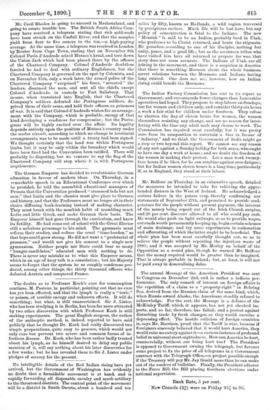The annual Message of the American President was sent to
Congress on December 2nd, and is rather a tedious per- formance. The only remark of interest on foreign affairs is the repetition of a claim to a " property-right " in Behring Sea, derived from the Russian claim of the same kind, which, when Russia owned Alaska, the Americans steadily refused to acknowledge. For the rest, the Message is a defence of the McKinley Tariff, which, it appears, has not yet checked im- ports, and so far, therefore, has failed; and a protest against disturbing trade by fresh changes, as they would exercise a depressing effect. The hostile criticism of foreign countries is, says Mr. Harrison, proof that the Tariff is wise, because if foreigners sincerely believed that it would hurt America, they would raise no outcry against it—a curious instance of profound belief in universal short-sightedness. How can America be hurt, commercially, without our being hurt too P The President is opposed to Government owning the telegraph, but favours some project to fix the price of all telegrams in a Government contract with the Telegraph Office,—a project possible enough if the Treasury will pay Mr. Jay Gould more than he can make out of the senders of bulletins. Finally, the President adheres to the Force Bill, the Bill placing Southern elections under national supervision.






















































 Previous page
Previous page